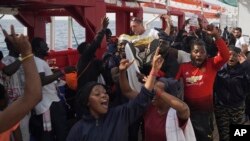Interior ministers from five European countries reached a preliminary agreement on how to distribute migrants picked up in the central Mediterranean. The agreement was reached Monday during a meeting in Malta and is scheduled to be discussed by all European Union members next month.
EU Migration and Home Affairs Commissioner Dimitris Avramopoulos said good progress was made in Malta towards a predictable and structural set of arrangements to deal with migrants rescued in the Mediterranean.
He said the ministers worked to find practical solutions to respond together, in a spirit of solidarity, to the migratory challenges.
“We all agree that the current ad hoc approach consisting of the commission coordinating solidarity efforts each time a vessel with migrants is at sea is simply not sustainable,” said Avramopoulos.
Malta’s Interior Minister Michael Farrugia, who hosted the meeting, which also included Germany, France, Italy and Finland, said an agreement was reached on the disembarkation of migrants following search and rescue operations. He said a paper was ready to be presented to the other EU members.
"There is an agreement of a common paper that will be presented to the Council of Ministers of home affairs on October 8," Farrugia said.
Under the preliminary agreement, vessels which rescue people at sea will be given a safe harbor to disembark passengers without delay, avoiding additional hardships to migrants. The agreement also calls for the swift relocation of asylum-seekers, on a voluntary basis, to other member states.
Avramopoulos said the migrant crisis is a responsibility for all of the EU which must be addressed collectively.
He added that the European Commission would continue to provide active support to member states struggling with the burden of migration, adding that this support would be operational, financial and political.
“I remain convinced that the structural and permanent solution embedded in the common European asylum system remains necessary and is the only viable solution in the medium term,” said Avramopoulos.
Italy and Malta have in recent months closed their ports to NGO vessels that rescued migrants but those policies are likely to change with the new agreements now being discussed.
Thousands of migrants from Africa and the Middle East continue their efforts to reach European shores, sometimes on very unsafe vessels. Both Italy and Malta have long accused other EU nations of dragging their feet on the migration burden they face on a daily basis.





